Overview Link to this section
Learning and thinking are as much a collective enterprise as they are an individual endeavor. Create many opportunities for students to engage in partner, small group, and whole-class collaboration through play, exploration, and group-worthy cooperative tasks.
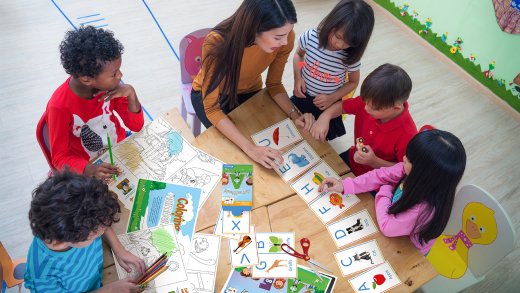
Support students in navigating lifelong questions of: 'Who am I and how do I connect and learn with others who are different from me?' 'How do I solve problems with my peers?' and 'How do I learn about and function within various contexts?'. Include regular opportunities for students to build on each other’s thinking and routines for navigating what to do when disagreement or conflict arises. Scaffold students’ ability to give and receive constructive feedback.
Supporting Collaboration Link to this section
Use these practices to deepen student learning and academic ownership
Collaboration Norms
When implemented at the beginning of the year, norms creation serves the powerful role of being the first message students hear about how their classroom is going to run: ”I care about what you say. I care about what you think. We’re in this together.”
Some Types of Collaboration
Check out the resource below (Discourse Routines & Protocols for Structured Talk and Interactions) and this video by The Bell Foundation for school practitioners featuring some ideas on how to support students' learning and language development with collaboration.
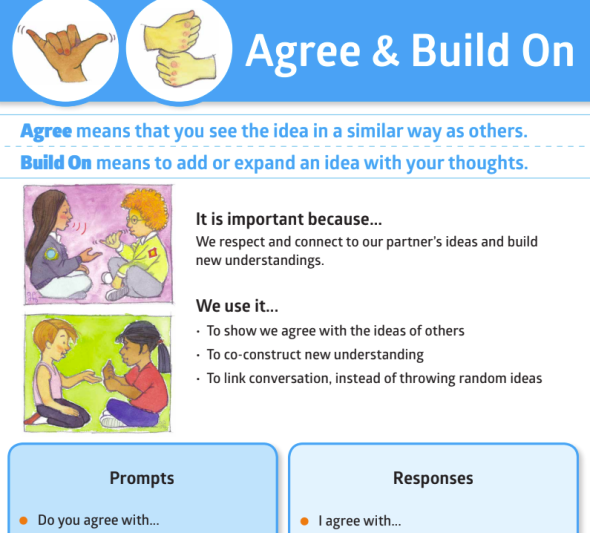
Conversation Moves
Teach and use conversation movements along with the associated responses and prompts to support and deepen collaborative conversation
Think, Pair, Share
This routine encourages students to think about something, such as a problem, question or topic, and then articulate their thoughts. The Think, Pair, Share routine promotes understanding through active reasoning and explanation. Because students are listening to and sharing ideas, Think, Pair, Share encourages students to understand multiple perspectives.
Partner Reading
Partner Reading and "reading playdates" support budding readers to share and learn with and from one another. Kindergarteners can put a post-it next to an "aha" part or a tricky word and share it with their reading buddy. Teachers can create many opportunities for students to help one another in their shared goal of becoming better readers.
Tell, Ask, Give - Feedback
Students tell their peers what they liked about the work. Then, students ask a thoughtful question. This takes some modeling. Last, students give a positive suggestion to improve the work.
Community Circles
Create daily opportunities for students to learn about each other and from each other through circles and class meetings. These can be academic-focused and community-focused to solve problems together as a class or reflect with each other. Having a class puppet or stuffed animal as a talking piece can support students with turn-taking.
Appreciations, Apologies, & Ahas!
Five and six-year-olds are learning to negotiate with others and use words to express their feelings and solve conflicts. Establishing routines that create space for appreciation, apologies, and ahas at the close of a day can support kindergarten students to reflect with one another on their role as community members and on their shared learning experiences.
Student Artifacts Link to this section
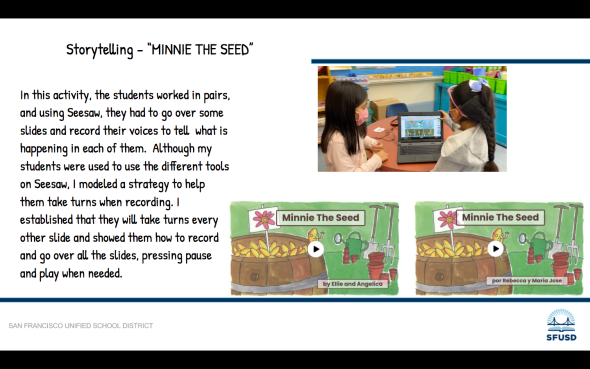
Group Storytelling through Seesaw
Students worked in pairs using Seesaw to narrate a series of slides for a presentation. They alternated narration by slide to create a presentation reflecting their collective thinking and individual voices.
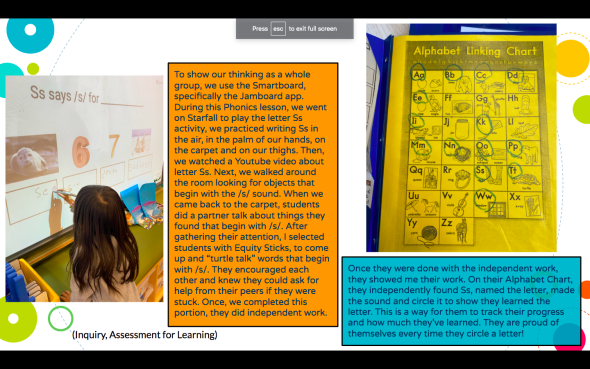
Learning Collaboratively
Students engaged in whole-group, partner, and individual learning to build an understanding of the letter 's'.
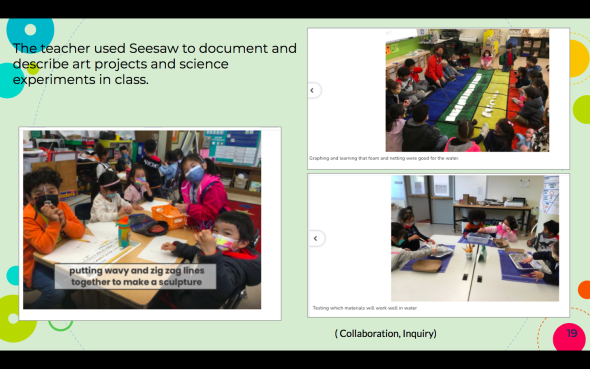
Sharing the Learning with Families
Students and the teacher used Seesaw to document and describe class art projects and science experiments. Families connected to the Seesaw for Families App. were able to view them on their registered phones.
Fostering a Culture of Collaboration
Here are some activities to create a "culture of collaboration" in your classroom:
- With students, identify a behavior or behaviors that might improve teamwork -- for example, "disagree respectfully" or "build on each other's ideas". Co-create a definition with students and post it in the classroom.
- Give students the opportunity to critically observe, label, and discuss the new behaviors in an objective and academic way. Young students should be able to name the behaviors in their own words.
- Ask students to reflect on their own development and growth regarding the new behaviors.
- Start the year with team-building activities, such as games and get-to-know-you conversations. Make sure to include design or construction challenges, that incorporate and develop specific behaviors such as inviting new ideas from teammates or building on another person's ideas. Include targeted reflection or another post-activity discussion to reflect on such questions as
- What did your team do well? How are you successful?
- Did your team have challenges? What were they? How did you solve them?
- When did someone in your team help another member of the team?
- How did you contribute to your team's success?
- Did your team meet its goals? How do you know?
-
Practice how to make a decision by consensus using and engaging topics such as "What should we have for a snack after school?"
-
Discuss or co-create a collaboration rubric so students understand what good and not-so-good teamwork looks like, and ask students to use the rubric at check-ins to reflect on how they're doing.
(adapted from Project Based Learning Handbook by PBL Works pg. 114)
Standards-Based Skills: Students will be able to...
- Organize and participate in planning cooperative play activities with several peers who are different from me. (GP)
- Negotiate with others and use words to respond and explain how to solve a conflict, or take action when someone is unfair. (GP)
- Contribute actively to class and group discussions, asking questions, responding appropriately, and providing useful feedback. (ELD)
- Demonstrate knowledge of content and communicate information through oral presentations, collaborative conversations, and multimedia. (ELD) (NGSS)
- Participate in collaborative conversations with diverse partners about kindergarten topics and texts with peers and adults in small and larger groups; Follow agreed-upon rules for discussions (e.g., listening to others and taking turns speaking about the topics and texts under discussion), Continue a conversation through multiple exchanges. (CCSS) (C3)
- Compare their own point of view with others’ perspectives and use listening, consensus-building, and voting procedures to make decisions and take action. (C3) (GP)
- Explain how all people, not just official leaders, play important roles in a community and work to make decisions, accomplish common tasks, establish responsibilities and fulfill roles. (C3)
These skills are taken from the kindergarten standards found within the - Common Core State Standards, Next Generation Science Standards, College Career and Civic Life Framework for Social Studies, ELD Framework, and SFUSD Graduate Profile.
Reflection Questions Link to this section
- How can collaboration develop academic ownership and honor students' experiences?
- What does collaboration currently look like in your practice? What is working well for students? How do you know?
- What are the implications for your own practice? What will you do first?
This page was last updated on April 26, 2023

